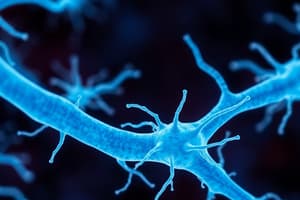Podcast
Questions and Answers
Which cranial nerve is associated with the sense of smell?
Which cranial nerve is associated with the sense of smell?
- Facial (VII)
- Optic (II)
- Olfactory (I) (correct)
- Vestibulocochlear (VIII)
Which spinal nerve plexus innervates the hip and lower limbs?
Which spinal nerve plexus innervates the hip and lower limbs?
- Sacral plexus
- Lumbar plexus (correct)
- Brachial plexus
- Cervical plexus
What type of neurons are found in the ventral root of a spinal nerve?
What type of neurons are found in the ventral root of a spinal nerve?
- Sympathetic trunk ganglion neurons
- Axons of sensory neurons
- Autonomic and somatic motor neurons (correct)
- Cell bodies located in dorsal root ganglia
Which spinal nerve connects to the diaphragm?
Which spinal nerve connects to the diaphragm?
What surrounds each individual axon and myelin in a spinal nerve?
What surrounds each individual axon and myelin in a spinal nerve?
Which structure controls the shape of the lens and causes the lens to focus?
Which structure controls the shape of the lens and causes the lens to focus?
What is the function of the fovea centralis?
What is the function of the fovea centralis?
Which part of the eye is avascular and transparent?
Which part of the eye is avascular and transparent?
What causes the tympanic membrane to vibrate?
What causes the tympanic membrane to vibrate?
Which structure links the middle ear with the nasopharynx?
Which structure links the middle ear with the nasopharynx?
What is the function of the bony labyrinth in the inner ear?
What is the function of the bony labyrinth in the inner ear?
What is found in the cochlear duct?
What is found in the cochlear duct?
What separates the cochlear duct from the scala tympani?
What separates the cochlear duct from the scala tympani?
What is responsible for sending electrical impulses to the brain via cranial nerve VIII (vestibulocochlear nerve)?
What is responsible for sending electrical impulses to the brain via cranial nerve VIII (vestibulocochlear nerve)?
What type of stimuli do interoceptors detect?
What type of stimuli do interoceptors detect?
Which stimuli do mechanoreceptors respond to?
Which stimuli do mechanoreceptors respond to?
How many successive neurons do spinal pathways consist of?
How many successive neurons do spinal pathways consist of?
Which tracts are included in the ascending tracts of spinal pathways?
Which tracts are included in the ascending tracts of spinal pathways?
What are the effectors of the Autonomic Nervous System?
What are the effectors of the Autonomic Nervous System?
What does the Somatic Nervous System involve?
What does the Somatic Nervous System involve?
What are the subdivisions of the Autonomic Nervous System?
What are the subdivisions of the Autonomic Nervous System?
What are the differences between Sympathetic NS and Parasympathetic NS?
What are the differences between Sympathetic NS and Parasympathetic NS?
What is the superficial layer of the eye called?
What is the superficial layer of the eye called?
Flashcards are hidden until you start studying
Study Notes
Sensory Systems Classification
- Interoceptors detect internal stimuli in viscera, blood vessels, etc.
- Mechanoreceptors respond to mechanical stimuli like pressure, touch, stretch, and vibration.
- Spinal pathways consist of three successive neurons: 1st order neurons, 2nd order neurons, and 3rd order neurons.
- Ascending tracts of spinal pathways include posterior (dorsal) column pathways, spinocerebellar pathways, and anterolateral (spinothalamic) pathways.
- The motor systems include the Somatic Nervous System and the Autonomic Nervous System.
- The Somatic Nervous System involves upper and lower motor neurons for skeletal muscle control.
- The Autonomic Nervous System has preganglionic and postganglionic neurons, with the effectors being cardiac muscle, smooth muscle, and glands.
- The Autonomic Nervous System is subdivided into the sympathetic NS and the parasympathetic NS, which have different functions.
- Comparison of Sympathetic NS and Parasympathetic NS includes differences in the cell body of preganglionic neuron, autonomic ganglia location, axon length, function, and nerve exit points.
- The eye is a three-layered sphere filled with fluid, with the fibrous tunic as the superficial layer.
- The fibrous tunic includes the sclera, cornea, and conjunctiva, serving as protective and light-permitting structures for the eye.
Studying That Suits You
Use AI to generate personalized quizzes and flashcards to suit your learning preferences.




